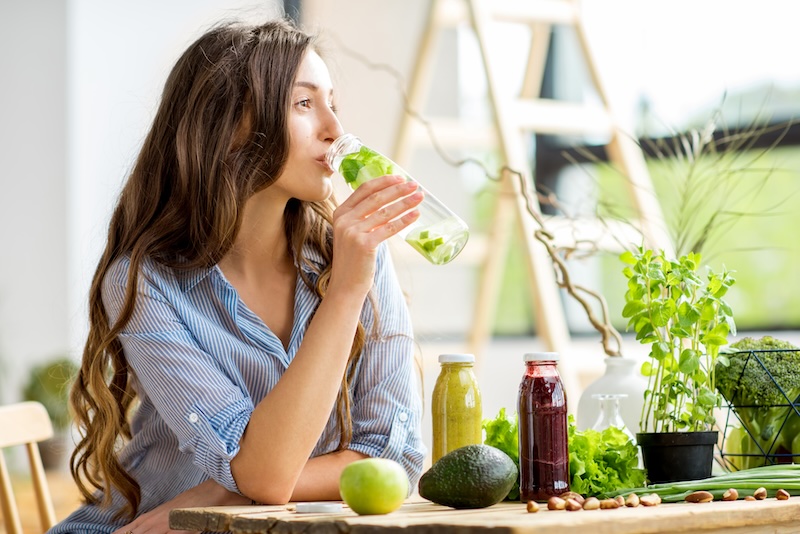Staying hydrated is especially important during the warmer months, but is critical year-round. From a Western medical perspective, water intake is vital for carrying nutrients and oxygen to your cells, flushing out bacteria from your bladder, getting rid of waste, relieving constipation, regulating blood pressure and body temperature, maintaining electrolyte balance in your cells, helping digestion, and lubricating and cushioning joints. Because the brain is largely made of water, proper hydration is imperative to maintain concentration, critical thinking skills, memory, reaction time, accuracy during complex tasks, good mood and more (OSHA, 2023).
According to Chinese Medicine, drinking sufficient water ensures proper kidney and bladder function, regulates the body’s fluids, promotes proper flow of qi (energy), keeps yin and yang in balance, and helps to maintain optimal health (TCM Blog, 2024). But exactly how much water should you drink? Sources vary. The Mayo Clinic (2022) follows the advice of the U.S. National Academies of Sciences, Engineering, and Medicine, stating that “an adequate daily fluid intake is:
- About 15.5 cups (3.7 liters) of fluids a day for men
- About 11.5 cups (2.7 liters) of fluids a day for women
These recommendations cover fluids from water, other beverages and food. About 20% of daily fluid intake usually comes from food and the rest from drinks.”
Acupuncturists and some other healthcare providers tend to recommend drinking ½ ounce of water per pound of body weight. Therefore, if you weigh 150 pounds, you would aim to drink 75 ounces of water or liquids per day. Other practitioners recommend adjusting fluid intake according to the color of your urine. If it is light yellow or clear, it indicates that you are properly hydrated.
When all is said and done, if we take food out of the equation, most people would benefit from drinking at least 64 ounces of water or other fluids per day. However, there are various circumstances that may require you to increase your water intake. These include:
- Where you live: Hotter climates will necessitate increased water intake.
- How much you exercise: The more you exercise, the more water you will need to drink.
- If you are pregnant or breastfeeding: Proper hydration is critical to keep you and your baby healthy when you are pregnant and to generate sufficient breastmilk and proper flow.
- If you have are sick or ill: If you have a fever, diarrhea, vomiting or are otherwise ill, you will need to stay hydrated to help reduce your risk of dehydration and allow you to recover quickly.
It is important to be aware of the signs and symptoms of dehydration in adults, children and infants. In infants and young children, dehydration may present itself as “dry mouth and tongue, no tears when crying, no wet diapers for three hours, sunken eyes or cheeks, [a] sunken soft spot on top of [the] skull, [or] listlessness or irritability” (Mayo Clinic, 2021). In adults, it may present as “extreme thirst, less frequent urination, dark-colored urine, fatigue, dizziness, [and/or] confusion” (Mayo Clinic, 2021).
When it comes to what you drink, Chinese Medicine believes that warm or room temperature water, bone broth, and hot tea are the best choices. These liquids can strengthen digestive energy, and support your spleen and stomach. An interesting study by Redford et al. (2021) showed that hot tea can cause vasodilation through activation of a potassium channel. Vasodilation is the widening of your blood vessels, which lowers blood pressure and allows more oxygen, nutrients, and electrolytes to enter your system (Cleveland Clinic, 2022). Additionally, many hot teas, such as green teas and herbal teas, can be a good source of epicatechins, antioxidants/polyphenols, and other beneficial compounds.
Cold and/or iced water and drinks, and carbonated or seltzer waters can be too damaging or stimulating to the system, respectively, according to Chinese Medicine (Sterman, 2017). This can cause imbalances and digestive issues, so it is best to limit your intake, even if it is very hot outside. In more extreme heat or during or following intense exercise, it is best to drink room temperature water, and add electrolytes. Coconut water and many fruits, such as watermelon, strawberries or tart cherries are high in electrolytes, or adding a bit to your water can help you avoid dehydration and muscle cramps, and reduce inflammation (Schlichter, 2024). Limit your intake of alcohol and sugary drinks, such as sodas or juices.
Beyond what we drink, it’s also important to “eat” your water. This means eating plenty of water-rich foods such as vegetables and fruit. Cucumbers, tomatoes, spinach, lettuces, mushrooms, melons, citrus fruit, berries and more can help you meet your hydration needs while providing important vitamins and minerals. During the warmer months, especially the late summer, our bodies are better able to digest raw foods. Feel free to indulge in a loaded salad or a juicy peach, and know you are boosting your hydration!
References
Cleveland Clinic (2022, June 23). Vasodilation. https://my.clevelandclinic.org/health/diseases/23352-vasodilation
Hydration- Water in Chinese Medicine. TCM Blog. Accessed on July 9, 2024: https://tcmblog.co.uk/water-element-chinese-medicine/
Mayo Clinic (2021, Oct 14). Dehydration. https://www.mayoclinic.org/diseases-conditions/dehydration/symptoms-causes/syc-20354086
Mayo Clinic (2022, Oct 12). Healthy Lifestyle: Nutrition and healthy eating. https://www.mayoclinic.org/healthy-lifestyle/nutrition-and-healthy-eating/in-depth/water/art-20044256
OSHA (2023). Sqwincher: The Cognitive Effects of Proper Hydration. https://www.osha.gov/sites/default/files/2023BeatTheHeatWinners/Contest_Innovative_KentPrecision_CognitiveEffectsHydration.pdf
Redford, K.E., Rognant, S., Jepps, T.A., & Abbott, G.W. (2021). KCNQ5 Potassium Channel Activation Underlies Vasodilation by Tea. Cellular Physiology and Biochemistry, 55(S3), 46-64. doi.org/10.33594/000000337.
Sterman, A. (2017). Life begins with water II. Golden Flower Chinese Herb. http://www.axosacupuncture.com/blog/2017/4/25/life-begins-with-water-ii
Schlichter, S. (2024, Jan 24). Over sports drinks? These fruits are naturally rich in electrolytes. Run: Outside. https://run.outsideonline.com/nutrition-and-health/training-nutrition/electrolyte-rich-fruits-summer-hydration/
Note: This article was originally published in a local magazine for their August 2024 issue. For citation references, please contact Dr. Yocum at https://jenyocum.com/contact/


Recent Comments